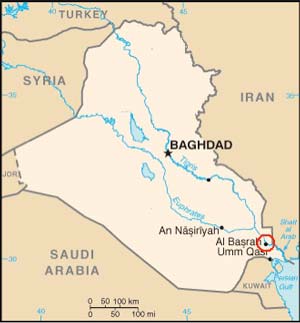- Trending:
- Pope Leo Xiv
- |
- Israel
- |
- Trump
- |
- Social Justice
- |
- Peace
- |
- Love

RELIGION LIBRARY
Sunni Islam
Suffering and the Problem of Evil
The problem of evil, and general questions about why suffering exists, why bad things happen to good people and vice versa, which are encompassed by the broad term "theodicy," are fundamental to many philosophical and religious traditions. Muslim theologians did not address the problem of evil directly as such, but they did ask questions about good and evil, what to do about them, and who created them and was responsible for them.
From an Islamic perspective, these questions are related to fundamental inquiries into the nature of good and evil, the nature of God (i.e., why would a Merciful God create a world in which evil exists, etc.), and the nature of the human condition. Muslims believe that only God has creative power, and that he is just, omnipotent, and omniscient. Thus a particularly important question in this vein, from an Islamic perspective that includes a concept of a judgment day and accountability in an afterlife, is how people could be punished if God is responsible for everything, including human actions. This is tied in to the question of why it is that bad things can happen to good people - shouldn't a just God reward good deeds and punish bad deeds appropriately?
One way to answer the question of why evil exists is to claim that it is not God who commits bad actions - people do. This answer hinges on a conception of free will, on the notion that humans are, to a degree, free to make independent choices. The first great theological controversy in the Islamic world occurred over precisely this question, because it seemed to run against other prevailing notions about the omniscience and omnipotence of God.
An early Islamic movement called the Qadariyya (from the Arabic word for fate, qadar) held that humans had free will. This belief stemmed in part from a desire to resolve issues pertaining to the problem of evil. If humans were to be held accountable for their actions, which they had to be if God was just, then each person deserved the reward or punishment they received. In order to preserve a vision of a just God, Qadaris insisted on free will.
There was also a political dimension to this belief. The Umayyad dynasty of the late 7th and early 8th centuries defended its authority by arguing that they were in power by special ordinance from God. The Qadaris, who believed the Umayyad caliphs were despotic, opposed this claim by arguing that they were acting out of free will, not out of divine support.
Qadaris were one of several theological movements in Islam that claimed to be ideologically related to al-Hasan al-Basri, who died in the third or fourth decade of the 8th century. In particular, al-Hasan al-Basri refused to believe that God would predestine people to sin. This view against predestination would eventually create great discomfort for Sunni orthodox theologians.
A second theological conflict that occurred in the classical period of Islam was the Mutazilite controversy - initiated by one of al-Hasan al-Basri's pupils ¬- and it also is related to the discourse on free will. Often described as a discourse that pitted "traditionalists" (proto-Sunnis) against "rationalists" (Mutazilis), there were several points of difference between the two main groups. Mutazilism flourished in the east, especially in  Baghdad and Basra, from the 8th to the 10th centuries. The main points of disagreement it had with the emerging Sunni belief (the primary school of which came to be called Asharism after its founder Al-Asahri) had to do with the questions of suffering and predestination, the nature of God and justice, and major questions of good and evil.
Baghdad and Basra, from the 8th to the 10th centuries. The main points of disagreement it had with the emerging Sunni belief (the primary school of which came to be called Asharism after its founder Al-Asahri) had to do with the questions of suffering and predestination, the nature of God and justice, and major questions of good and evil.
Mutazilis believed that humans could discern the difference between good and evil and choose freely, that a just God would be compelled to reward good deeds and punish bad ones, and that this was the essential character of the relationship between humans and God. Sunnis, on the other hand, were reluctant to argue that God, who was above human rules and rationality, could be compelled to do anything, even to be bound by his own nature. To preserve the Sunni tenet of God's complete and utter transcendence and superiority, their rejoinder to the Mutazilis was that God alone determined what was just and unjust, that God alone determined what was good and what was evil, and that human perception is inferior to God's precepts. It was God's prerogative, they argued, to have bad things happen to good people, for reasons he alone could possess and discern, and it was humankind's responsibility to accept and submit to his will.
| The Opening Chapter of the Holy Quran |
|
This perspective may seem counter-intuitive to modern sensibilities, and it was not meant to seem bullheaded or stubborn. Though Sunnis believed in a merciful and compassionate God, they did not want to submit that God to human processes of judgment and reason. Mutazilis and Sunnis disagreed over other points of doctrine and interpretation as well, but these fundamental issues about why people suffer, what really constitutes that suffering and its justice, centered on their different conceptions of who has agency in human life and what that means for predestination and free will. These questions are in turn related to conceptions of divine justice and the nature of God and God's relationship to human beings. As a theological school, Mutazilism as such did not survive, and Ashari Sunni theology has become, with some exceptions, the mainstream and defining theological school for most Sunni Muslims.
Study Questions:
1. Why is the question of evil a question of Allah’s nature?
2. How does Sunnism answer the question, “Why do bad things happen to good people?”
3. What did the Mutazilism school teach about free will?










